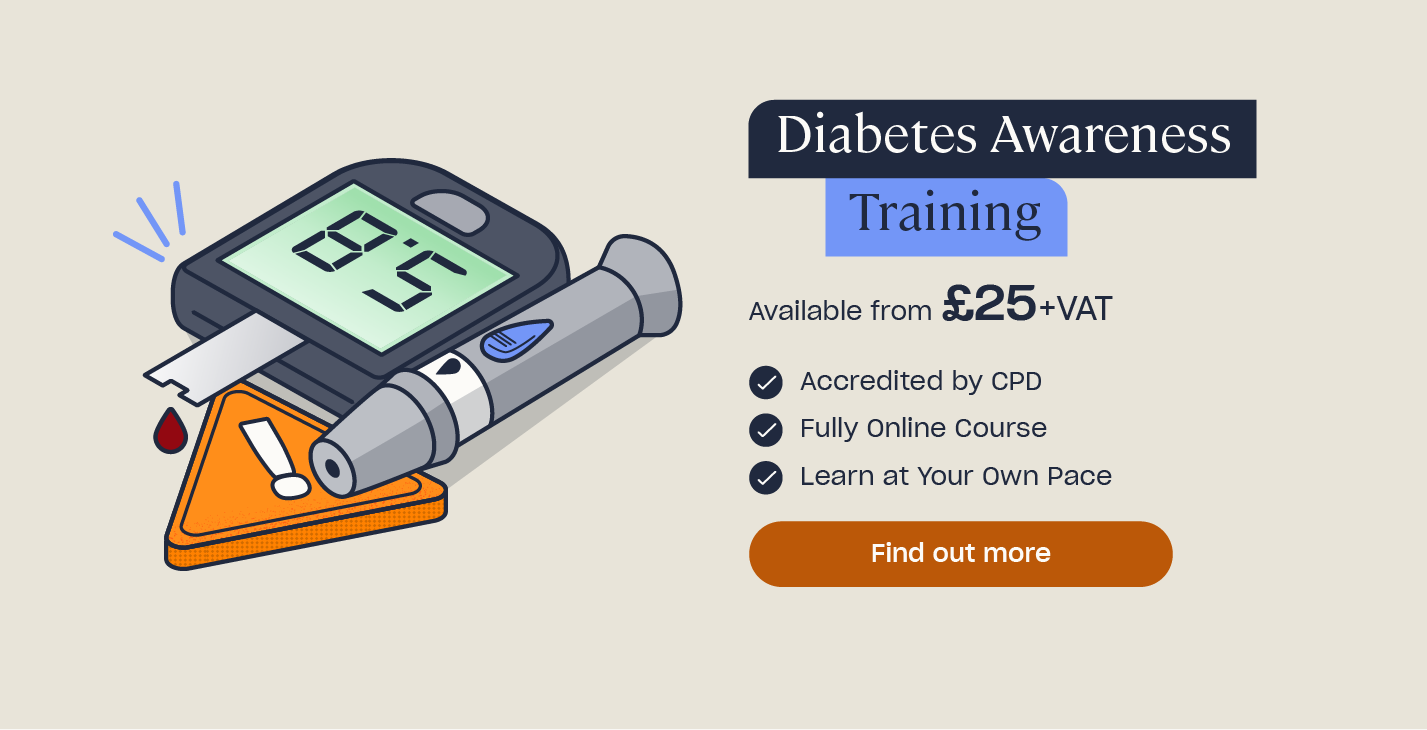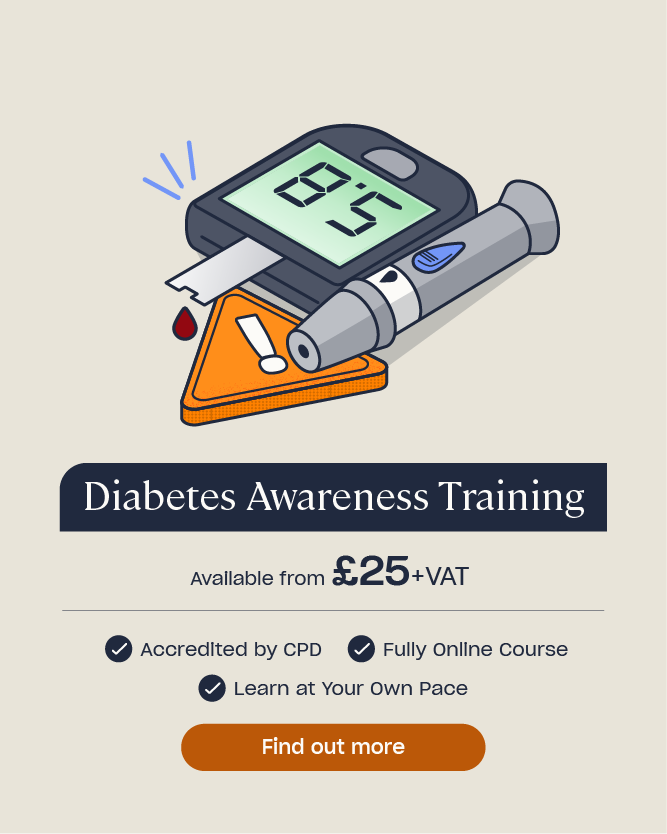Hypoglycemia Awareness: Guidance on Diabetes Complications
Diabetic hypoglycemia occurs when the level of sugar, also known as glucose, in somebody’s blood drops too low. Diabetic hypoglycemia usually affects people with diabetes, especially if they take insulin, and can be very dangerous. It is important to pay attention to the early warning signs and symptoms of hypoglycemia and treat them promptly as if left untreated, it can become life-threatening.
Knowing what to look for and what to do if an individual is experiencing hypoglycemia is important as they aren’t always able to respond themselves. This article outlines what hypoglycemia is, the symptoms and the main causes. It will also provide guidance as to how this can affect people with diabetes, alongside some prevention tips.
What is Hypoglycemia?
Hypoglycemia often affects people with diabetes and happens when blood sugar levels drop too low. It is also referred to as a ‘hypo’, or simply a low blood sugar level and is defined as a blood sugar level below 70 milligrams per decilitre, or 3.9 millimoles per litre.
Because the brain depends on glucose for energy, hypoglycemia interferes with the brain’s ability to function properly. This can cause dizziness, headaches, blurred vision, difficulty concentrating and other neurological symptoms. Hypoglycemia also triggers the release of hormones that the brain relies on to raise blood sugar levels, namely adrenaline and cortisol. The release of these hormones causes additional symptoms of tremors, sweating, rapid heartbeat, anxiety and hunger.
Hypoglycemia is common in people with type 1 diabetes; however, it can affect people with type 2 diabetes that take insulin or other medications. Not everyone with diabetes will experience hypoglycemia, but it is common. It can also affect people who do not have diabetes – this is known as non-diabetic hypoglycemia and is a very rare condition.
Hypoglycemia can happen quickly, so it is important to know what the signs are and what to do if you, or someone else, is experiencing it.
Signs and Symptoms of Hypoglycaemia
It is important to pay attention to the early warning signs and symptoms of hypoglycaemia and treat them. It is also important to note that some people don’t have any noticeable signs and symptoms; therefore, it is crucial to regularly monitor blood sugar levels.
Early signs and symptoms include:
- Shakiness.
- Dizziness.
- Headaches.
- Sweating.
- Hunger.
- Rapid heartbeat.
- Inability to concentrate.
- Confusion.
- Irritability.
- Feeling anxious or nervous.

Severe signs and symptoms include:
- Clumsiness or muscle weakness.
- Inability to eat or drink.
- Difficulty speaking or slurred speech.
- Double or blurry vision.
- Drowsiness.
- Confusion.
- Seizures.
- Becoming unconscious or fainting.
What Causes Low Blood Sugar?
Low blood sugar is defined as a blood sugar level below 70 milligrams per decilitre, or 3.9 millimoles per litre. Dangerously low blood sugar is considered as anything below 3.0 millimoles per litre. There are many different causes for this and it varies from person to person.
Some common causes of low blood sugar include:
Taking too much insulin or medication – taking insulin or other diabetes medications can lower the blood sugar level. If someone takes too much of this medication, for example administering too much insulin for a meal, it can result in the blood sugar level dropping too low, causing hypoglycemia.
Not eating enough carbohydrates – carbohydrates include foods such as pasta, bread, potatoes and fruit and give the body energy. Not eating enough carbohydrates causes the glucose levels in the body to drop, which can lead to low blood sugar.
Postponing or skipping a meal – skipping a meal or not eating frequently enough can cause a drop in the blood sugar level, causing hypoglycemia.
Drinking alcohol – drinking heavily or drinking without eating can block the liver from releasing stored glucose into the bloodstream, causing hypoglycemia.
Increasing physical activity without eating more or adjusting medication – an increase in physical activity increases the demand for glucose for the muscles. If the food or insulin intake has not been adjusted to accommodate for this, it can lead to hypoglycemia.

Sometimes there is no obvious cause for low blood sugar and very occasionally it can happen to people who do not have diabetes. There are two types of non-diabetic hypoglycemia: reactive and fasting.
Reactive hypoglycemia occurs when there is too much insulin in the blood and usually happens a few hours after eating. It can also be caused by having prediabetes, stomach surgery or rare enzyme defects.
Fasting hypoglycemia happens when someone goes eight hours or longer without food. It also has other causes such as too much alcohol, medicines such as aspirin and certain tumours.
Looking to Learn More?
For more information on hypoglycemia, take a look at our Diabetes Awareness Training. It covers different types of diabetes, the possible complications associated with them and how to manage the condition.
How Does Hypoglycemia Affect People with Diabetes?
The brain depends on glucose as its primary source of energy. When the blood sugar is low, the brain cannot function properly. Therefore it is important to respond to low blood sugar, particularly for those with diabetes.
Hypoglycemia episodes can range from mild to severe. Mild hypoglycemia can be treated by the individual experiencing it and are, to a certain extent, expected by people who take insulin. Mild hypoglycemia is not a cause for serious concern, unless it occurs very regularly or for long periods of time.
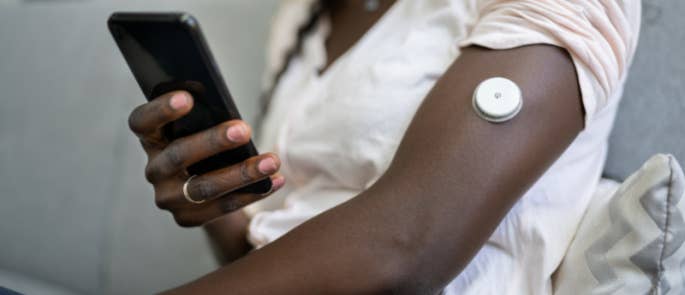
Severe hypoglycemia, however, will require treatment from someone else and may require extra medical attention. Severe hypoglycemia can lead to immediate danger if it is not treated immediately and, whilst rare, severe hypoglycemia can lead to a coma or death.
There are some long-term effects of hypoglycemia including an increased vulnerability to conditions such as heart disease, kidney disease and nerve damage. Low blood sugar can also affect a person’s mood and mental status.
Fluctuations in blood sugar can cause rapid mood changes, including low mood and irritability, especially during hypoglycemic episodes. Others can experience a slightly euphoric feeling, similar to being drunk. When blood sugar levels return to a normal range, these symptoms often resolve.
Hypoglycemia Unawareness
Hypoglycemia unawareness is a situation where people with diabetes, usually type 1, are frequently unable to notice when they have low blood sugar. This can be troubling and dangerous, so taking steps to regain awareness is strongly recommended.
Most people are able to recognise the symptoms of hypoglycemia however, symptoms vary between people and even in the same person at different times. This can be caused by a recent hypoglycemia episode, stress, depression and alcohol consumption.
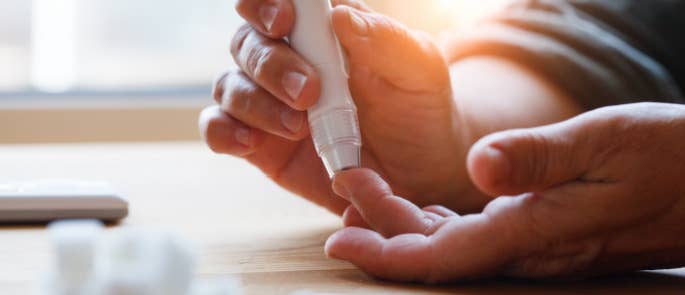
Hypoglycemia unawareness can be dangerous in many situations, therefore steps should be taken to regain it. Testing blood sugar more often, recording events that occur before a hypoglycemia incident and consciously making yourself aware of the symptoms will help. For example, if you have trouble speaking or become dizzy, don’t dismiss it for being tired or as an unusual incident. Instead, acknowledge that it could possibly be hypoglycemia and measure your blood sugar levels to be sure.
Hypoglycemia Treatment & Prevention Tips
There are ways to help prevent hypoglycemia, as well as ways of treating it. It is important to remember that hypoglycemia can be very dangerous and even life threatening if it is not treated quickly.
If the individual is conscious – give them a sugary drink or snack such as fizzy pop (not the diet version), fruit juice, a handful of sweets, glucose tablets or glucose gel. Test their blood sugar 10-15 minutes after – if it hasn’t increased give them another sugary drink or snack. If it has increased, encourage them to eat a meal or snack containing a slow-release carbohydrate such as a banana or cereal bar.
If the individual is unconscious – put them in the recovery position and call 999 or 112 if an injection of glucagon is not available or if they have had alcohol. If a glucagon injection is available, and you know how to use it, administer it immediately. If they wake up 10 minutes after the injection and feel better, give them something to eat. If they do not improve within 10 minutes, call 999 or 112 immediately.
If the individual is having a seizure or fit – stay with them and lie them down on something soft and away from any dangers. If the seizure lasts more than five minutes, call 999 or 112. When the seizure or fit stops, give them a sugary drink or snack. The individual’s diabetes care team should be notified when a seizure has occurred as they may require a medical assessment or need to discuss further treatment.
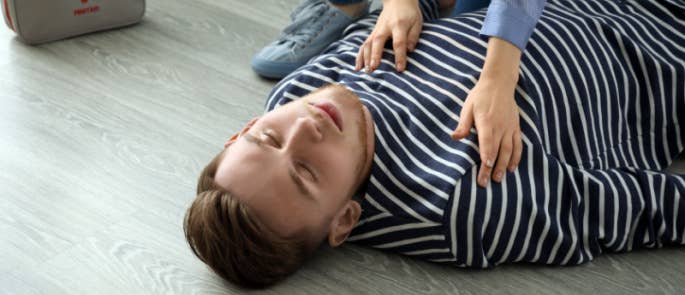
If an individual has repeated hypoglycemia episodes or if they stop getting hypoglycemia symptoms when their blood sugar is low, tell their diabetes team.
How to Prevent Hypoglycemia
In order to prevent hypoglycemia from occurring, it is important to understand why it is happening. Identifying patterns in regular low blood sugar levels can help you do this.
Some questions you could ask to identify a pattern include:
- Are the blood sugar levels low at similar times each day?
- Are blood sugar levels low after particular activities?
- Are blood sugar levels low after periods of stress or illness?
- Are blood sugar levels low in warmer or colder environments?
A few ways of preventing hypoglycemia include:
- Monitoring blood sugar levels. Ideally they should be checked several times a day.
- Not skipping meals or snacks.
- Carrying a glucagon injection kit or a snack.
- Measuring medication, taking it consistently and as recommended by the doctor.
- Adjusting medication to match exercise levels. However, this is dependent on blood sugar levels, as well as the type and length of activity.
- Eating a snack or meal when drinking alcohol.
- Recording low glucose reactions to help identify any patterns.
- Recording blood sugar levels more often when stressed or ill.
Hypoglycemia occurs when the blood sugar levels drop too low and can be very dangerous, particularly for people with diabetes. It can be caused by multitude of things and symptoms vary from person to person, and even in the same person at different times. There are ways to prevent and treat hypoglycemia including regularly monitoring blood sugar levels and not skipping or avoiding meals.


